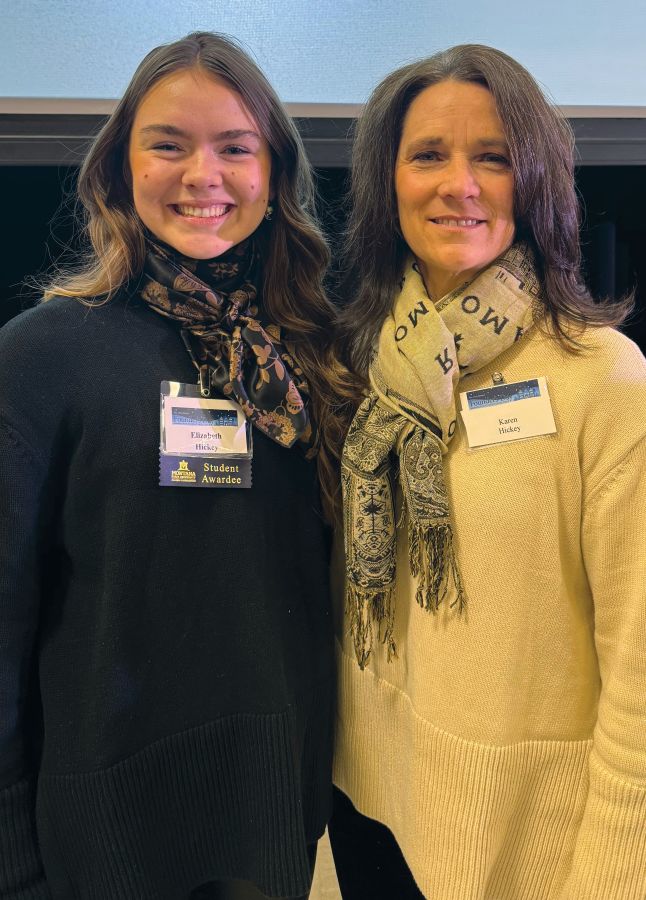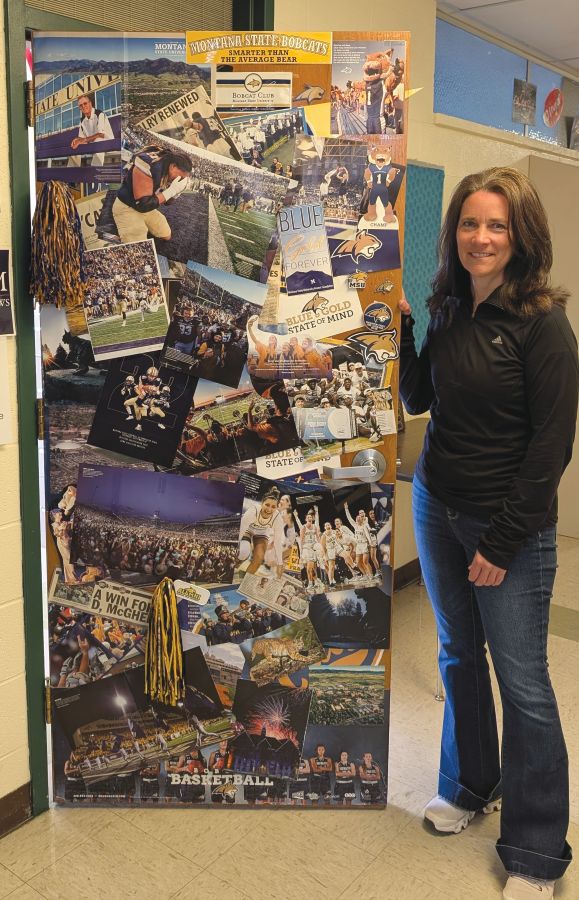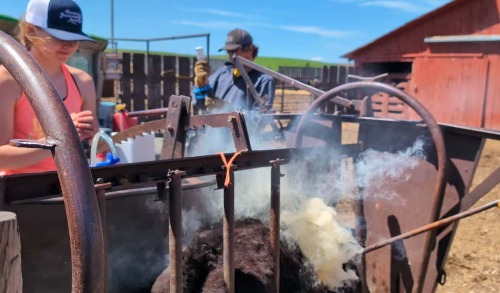Featured Montanan: A Teaching Tradition Passed from Mother to Daughter in Rural Montana
Nestled on a small rise among rolling hills and mixed forest, Hobson School stands framed by mountains and a clear, cobalt sky – an iconic snapshot of the Judith Basin. For passersby, its pride may seem rooted in the landscape, but for those who stay awhile, one of the biggest sources of inspiration can be found down its middle-school hallway. Upon making a turn at the office, one can immediately find Karen Hickey’s classroom, her door glittering with Montana State University (MSU) Bobcat blue and gold, a tangible testament to the fact that Montana State school spirit grows stronger with time.
Karen recently attended the 43rd annual Founders’ Day award ceremony to watch her daughter, Elizabeth Hickey, receive the same excellence award she had won 32 years prior. Karen described the event as a “full circle” moment, particularly because her professor (and nominator) was also in attendance, as they both watched Liz receive the prestigious award at MSU. Liz was honored to be recognized alongside previous winners like her mother and expressed that one of the reasons for her success is that she comes from a line of strong women.

Mother and daughter win the same Founders' Day award for student excellence, 32 years apart. Photo: Marcie Reuer
Liz’s great-grandmother, Annie MacDonell Hickey, single-handedly ran the Hickey Ranch near Hobson, while her husband was a blacksmith in Lewistown. Annie would ride on horseback between Lewistown and the ranch daily to ensure its operation. Her daughter-in-law, Karen Hickey, embodied that same trailblazing spirit and became the first person in her family to graduate from college – and the first person in her family to become a teacher. Both mother and daughter noted the significant influence 4-H had on their ability to be confident public speakers, community-oriented individuals, and problem solvers. She accepted herfirst job at Musselshell School teaching grades four through six in a multi-grade classroom, a position that over 50 other candidates applied for.
"She will always be there if you need her; she makes you want to engage in the learning; and she has young energy."
Today, Liz most admires that her mom is “the glue of the school, and anytime anyone has questions, they make their way to my mom’s classroom.” Her seventh and eighth grade students say “she will always be there if you need her; she makes you want to engage in the learning; and she has young energy.” Some other legends of Karen Hickey are “that she survives on two hours of sleep a week” and that she is “able to tell a joke and then talk about lizards,” but most importantly, that she makes her students “happy when [they] walk in the room.” Karen attests that teaching is not an easy job, but loves that it gives her the ability to still help on the ranch; it is valuable and fulfilling because she gets to have strong relationships with students and families.

Karen’s Bobcat décor began with a single poster, and she surmises that there are at least two or three layers of decorations. When Karen moved up to teach middle school students, the janitors took her door off the hinges and moved it to her new classroom. Photo: Pyper Sanofsky
Since beginning her own teaching journey, Liz respects that after 32 years of Karen’s dedicated service, she is continually learning and doing things in the classroom. Karen attributes her longevity in the classroom to finding strong mentors within her school and joining professional organizations to grow her skills as an educator. Her next goal is to be a torchbearer of the profession by encouraging young people, like her daughter, to become teachers.
Neither generation of Hickey teachers chose the profession initially. Karen was in general studies for two years until she began to reflect on how she would line up apple crates as a child and teach her dolls and stuffed animals “school.” She felt that perhaps teaching had been her lifelong calling all along. Liz originally had her heart set on a career in the sciences and to study at the University of Montana (much to the chagrin of her mother, a dedicated MSU Bobcat). Liz’s path changed at the behest of one of her high school peers, and she has come to love MSU in equal magnitude to her mother.
One of Liz’s most impactful MSU experiences was participating in the Rural Teacher Pathways Program, administered through the Center for Research on Rural Education. Hickey and her peers participated in a weeklong, immersive practicum experience in Glasgow, MT. She said the experience affirmed that rural schools are one of the best places to begin a teaching career due to the high level of support. Additionally, she was impressed by her peers, many of whom grew up in very urban areas, for being open to the possibility of rural living and teaching. Liz shared that her classmate, Pace Becker, grew up in Denver and accepted his first teaching job in Glasgow, noting that he may never have known rural teaching was a good fit for him without the low-stakes exposure the trip provided. She feels “MSU does a really good job of providing field options that fit the wants and needs of its education students.”

Liz aspires to venture into livestock photography in addition to teaching and values the freedom to pursue additional endeavors as a reason to become a teacher. Photo: Karen Hickey
Liz reflects on how ranch life influenced her teaching saying, “We were married to home, and our animals relied on us; they deserved a continuous presence the same way students deserve the continuous presence of their teacher in the classroom.” Liz will get the opportunity to make her mark at Manhattan High School in the fall of 2025, where she will teach high school science. After years of decorating her mom’s classroom, she will finally have the opportunity to curate “Miss Hickey’s Classroom.” This year, each graduating student teacher will be given a Bobcat classroom kit containing MSU posters and wall hangings, a practice inspired by the Hickey family.
Liz and Karen Hickey have impacted generations of rural educators who are the lifeblood of our state. High school students in Montana who want to learn more about how to become a teacher can join the Center for Research on Rural Education’s Future Rural Educators’ Club.
Marcie Reuer is co-leader of MSU’s Rural Teacher Pathways Program, and an associate teaching professor and Director of Outreach and Engagement in the Department of Education.
